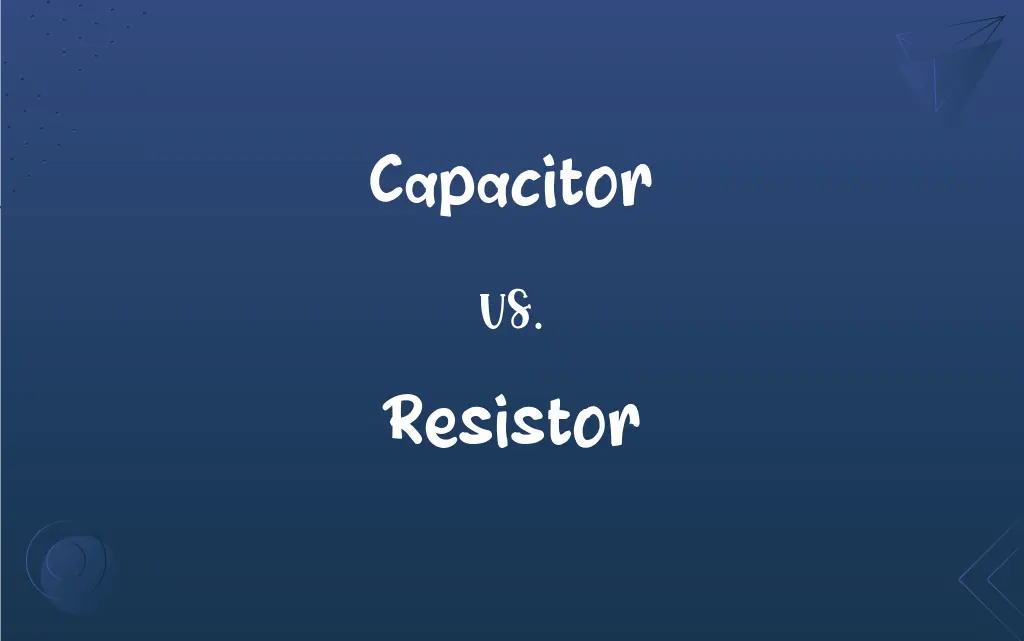Capacitor vs. Resistor: What's the Difference?
Edited by Aimie Carlson || By Harlon Moss || Published on December 30, 2023
A capacitor stores electrical energy in an electric field, while a resistor reduces current flow and lowers voltage levels within circuits.

Key Differences
A capacitor stores and releases electrical energy, functioning as a temporary battery. A resistor, conversely, impedes the flow of electricity, controlling current and voltage.
Capacitors are made with two conductive plates separated by an insulating material. Whereas, resistors are constructed with materials that oppose the flow of electrical current.
Capacitors are used to stabilize voltage and power supply, filter signals, and for energy storage. While, resistors are employed to adjust signal levels, divide voltages, and limit current.
Capacitors block direct current (DC) and allow alternating current (AC) to pass. In contrast, resistors reduce current flow in both AC and DC circuits without differentiating.
Capacitors do not dissipate energy but store it. Resistors convert electrical energy into heat, dissipating energy from the circuit.
ADVERTISEMENT
Comparison Chart
Function
Stores and releases electrical energy
Reduces current flow and voltage
Construction
Two conductive plates with an insulator
Material that opposes electrical flow
Usage
Stabilizing power supply, filtering signals
Adjusting signal levels, limiting current
Behavior with AC/DC
Blocks DC, passes AC
Impedes flow in both AC and DC
Energy Handling
Stores energy
Converts energy into heat
ADVERTISEMENT
Capacitor and Resistor Definitions
Capacitor
An electrical component that stores and releases energy.
The capacitor in the circuit stored the excess energy.
Resistor
An electrical component that restricts current flow.
A resistor was added to the circuit to reduce the current.
Capacitor
A component consisting of two plates separated by an insulator.
The charge is stored on the plates of the capacitor.
Resistor
Converts electrical energy into heat.
The resistor heated up as it impeded the electrical flow.
Capacitor
Used in electronic devices for temporary energy storage.
Capacitors in the flash unit store energy for quick release.
Resistor
Made from materials that oppose electrical flow.
The resistor's material helps dissipate excess energy as heat.
Capacitor
A device used for filtering and stabilizing electrical signals.
We added a capacitor to smooth out the voltage fluctuations.
Resistor
A device used to control the voltage within a circuit.
We used a resistor to divide the voltage across the circuit.
Capacitor
An element that can block DC and allow AC to pass.
The capacitor effectively blocked the DC current.
Resistor
Integral for adjusting signal levels in electronics.
Adjusting the resistor changed the signal's amplitude.
Capacitor
An electric circuit element typically consisting of two metallic plates separated and insulated from each other by a dielectric, used to store charge temporarily or to filter signal frequencies. Also called condenser.
Resistor
A device used to control current in an electric circuit by providing resistance.
Capacitor
(electronics) An electronic component capable of storing electrical energy in an electric field; especially one consisting of two conductors separated by a dielectric.
Resistor
One who resists, especially a person who fights against an occupying army.
Capacitor
A device used in electronic circuits to hold electrical charge, consisting of two conducting plates separated by a nonconducting (dielectric) medium; it is characterized by its capacitance.
Resistor
(electronics) An electric component that transmits current in direct proportion to the voltage across it.
Capacitor
An electrical device characterized by its capacity to store an electric charge
Resistor
An electrical device that resists the flow of electrical current
FAQs
Can capacitors conduct electricity?
They can store and release electricity but don't conduct it like a wire.
How does a capacitor work?
It stores energy in an electric field between two conductive plates separated by an insulator.
What are capacitors used for?
They're used in electronic circuits for energy storage, filtering, and signal processing.
Are capacitors reusable?
Yes, they can be charged and discharged many times.
What are the types of capacitors?
Common types include ceramic, electrolytic, and film capacitors.
What is a resistor?
A resistor is a component that resists the flow of electrical current.
What is a capacitor?
A capacitor is an electronic component that stores and releases electrical energy.
What are resistors used for?
They're used to control current, divide voltages, and limit current.
What are the types of resistors?
Common types include fixed, variable, wirewound, and carbon film resistors.
How are capacitors rated?
They are rated by capacitance, voltage, and tolerance.
Can a capacitor explode?
Yes, if overcharged or improperly used, they can explode.
What is capacitance?
Capacitance is the ability of a capacitor to store electrical charge.
How are resistors rated?
By resistance value, power rating, and tolerance.
Are resistors affected by temperature?
Yes, their resistance can change with temperature.
How does a resistor work?
It reduces current flow and lowers voltage levels within circuits.
Can resistors store energy?
No, they dissipate energy as heat but don’t store it.
What is resistance?
Resistance is the measure of how much a resistor opposes current flow.
How do resistors affect current flow?
They reduce the flow of current through a circuit.
How do capacitors affect current flow?
They can temporarily store current, affecting the flow in a circuit.
Can a resistor fail?
Yes, usually by breaking or burning out, which stops current flow.
About Author
Written by
Harlon MossHarlon is a seasoned quality moderator and accomplished content writer for Difference Wiki. An alumnus of the prestigious University of California, he earned his degree in Computer Science. Leveraging his academic background, Harlon brings a meticulous and informed perspective to his work, ensuring content accuracy and excellence.
Edited by
Aimie CarlsonAimie Carlson, holding a master's degree in English literature, is a fervent English language enthusiast. She lends her writing talents to Difference Wiki, a prominent website that specializes in comparisons, offering readers insightful analyses that both captivate and inform.






































































